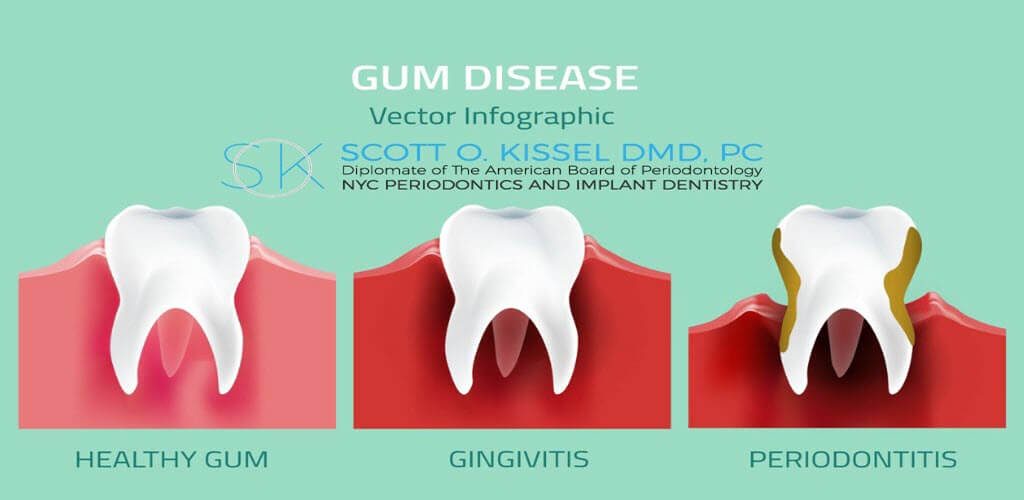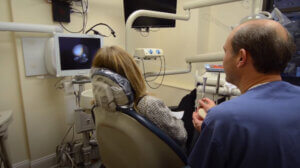Gum disease is a serious condition that affects millions of Americansover the age of 30 every year. It can cause pain, bleeding, bad breath, tooth loss, and even increase your risk of heart disease and stroke. But how do you know if you have gum disease? And what can you do to prevent it or treat it? Dr Kisselwould like to explain the signs and symptoms of gum disease, the causes and risk factors, and the best ways to protect your gums and teeth.
What is Gum Disease?
Gum disease, also known as periodontal disease, is an infection and inflammation of the gums and the supporting structures of the teeth. It is caused by bacteria that form a sticky film called plaque on the teeth. If plaque is not removed by brushing and flossing, it hardens into tartar, which can only be removed by a professional cleaning.
The bacteria in plaque and tartar irritate the gums, causing them to become red, swollen, and bleed easily. This is the first stage of gum disease, called gingivitis. Gingivitis is reversible with proper oral hygiene and dental care.
However, if gingivitis is left untreated, it can progress to periodontitis, which is more severe and irreversible. Periodontitis occurs when the bacteria and the inflammation spread below the gum line, destroying the fibers and the bone that hold the teeth in place. This creates pockets between the teeth and the gums, where more bacteria can accumulate and cause infection. Periodontitis can lead to tooth loss, gum recession, and changes in the bite.
What are the Signs and Symptoms of Gum Disease?
Gum disease can be silent and painless in the early stages, so many people may not be aware that they have it. However, there are some warning signs that you should look out for, such as:
- Bleeding gums when you brush or floss
- Red, swollen, or tender gums
- Bad breath that does not go away
- Pus between your teeth and gums
- Loose or shifting teeth
- Receding gums or teeth that appear longer
- Changes in the way your teeth fit together when you bite
If you notice any of these signs or symptoms, you should book an appointment with your NYC periodontist as soon as possible. The sooner you get diagnosed and treated, the better your chances of saving your teeth and preventing further damage.
What are the Causes and Risk Factors of Gum Disease?
The main cause of gum disease is poor oral hygiene, which allows plaque and tartar to build up on the teeth. However, there are other factors that can increase your risk of developing gum disease, such as:
- Smoking or chewing tobacco, which reduces blood flow to the gums and impairs healing
- Hormonal changes, such as pregnancy or menopause, which can make the gums more sensitive and prone to inflammation
- Diabetes, which affects the body’s ability to fight infection and control blood sugar levels
- Certain medications, such as steroids, anti-epilepsy drugs, or oral contraceptives, which can affect the gums
- Genetic factors, which can make some people more susceptible to gum disease
- Stress, which can weaken the immune system and affect the gums
- Poor nutrition, which can deprive the gums of essential vitamins and minerals
- Other diseases, such as HIV, cancer, or rheumatoid arthritis, which can affect the gums
How to Prevent and Treat Gum Disease?
The best way to prevent gum disease is to practice good oral hygiene habits, such as:
- Brushing your teeth twice a day with a fluoride toothpaste
- Flossing your teeth once a day to remove plaque from between the teeth
- Rinsing your mouth with an antiseptic mouthwash to kill bacteria and freshen your breath
- Visiting your dentist and periodontist regularly for checkups and cleanings
- Avoiding smoking and tobacco products
- Eating a balanced diet rich in fruits, vegetables, and dairy products
- Drinking plenty of water to keep your mouth hydrated and wash away food particles
Treatment Options
If you already have gum disease, you should seek professional treatment as soon as possible. Depending on the severity of your condition, your dentist may recommend one or more of the following options:
Scaling and Root Planing
Scaling and root planing(SRP) is a deep cleaning procedure that removes plaque and tartar from above and below the gum line and smooths the root surfaces to help the gums reattach to the teeth. At Dr Kissel’s NYC periodontal office, he prioritizes your comfort, during and after the procedure, and provides optimal results. He can achieve this by performing SRP using a perioscope (powerful dental endoscope/microscope that can display a magnified image (24-48x), allowing him to see any tartar you may have directly on the root of the affected tooth in large detail).
Laser Therapy
Laser therapy is a minimally invasive technique that uses a high-intensity light beam to remove diseased tissue and stimulate healing. Dr Kissel offers his patients laser treatment conducted with a microscope. He is one of the first NYC periodontists to combine the advantages of the microscope with Laser Assisted New Attachment Procedure (LANAP). This is a minimally invasive procedure that uses a special laser to remove the infected tissue and bacteria from your gums, without harming the healthy tissue. Laser periodontal treatment has many benefits, such as:
- Faster healing and recovery time
- Less pain and discomfort
- Preservation of healthy tissue
- Reduced bleeding and swelling
- Lower risk of infection and complications
- Improved gum health and appearance
Osseous Surgery
Osseous surgeryis performed in advanced cases of periodontitis where laser treatment would not be entirely effective. It involves lifting the gums, removing the infected tissue and bone, and reshaping the bone’s surface, and creating a tighter connection between gum tissue and the teeth.
Dr Kissel uses microsurgery and microsurgical instruments to make the procedure as non-invasive as possible. By using microsurgery he opens a tiny space between the gums and teeth to access the roots and surrounding bone. Then he cleans the roots, and performs steps to allow your own body to regenerate new tissues. Finally, he places micro-stitches to conclude the procedure. Normally, after the surgery, patients have no swelling or sensitivity.
Dental Implants
Dental implantsare artificial tooth roots that are inserted into the jawbone to replace missing teeth and support crowns, bridges, or dentures. Dental implants are designed to be a long-term solution for tooth loss. In fact, according to the American Academy of Implant Dentistry, studieshave reported a success rate of over 95%during a period of 10 years 12. Dental implants can last for several decades or a lifetime with proper care.
As a specialist in dental implant surgery and dental microsurgery, Dr Kissel uses the latest technology and techniques to ensure a more precise, safer and comfortable procedure. Using sophisticated microsurgical techniques enables him to navigate the delicate structures of your jawbone and gums with the utmost care, minimizing trauma, promoting faster healing and reducing the risk of complications.
Why Choose Dr. Kissel?
If you are looking for a periodontist and dental implant specialist in New York City, you should consider Dr Scott Kissel. He has over 25 years of experience and is a highly-qualified periodontist and dental microsurgeon. Dr. Kissel is:
- A board-certified periodontist with advanced training in dental implants, laser surgery, and microscopic procedures
- A pioneer in the use of microsurgery and the SMILE technique for dental implants, which provide better precision, comfort, and results
- A compassionate and caring professional who listens to your needs and concerns, and creates a personalized treatment plan for you
- A leader in the use of the latest technology and techniques, such as 3D imaging, piezo surgery, and LANAP laser surgery, which offer less trauma, less discomfort, and faster recovery
- A respected educator and author who lectures and writes about periodontal and implant topics, and contributes to the leading textbook in the field
Dr Kissel and his team are dedicated to providing you with the highest quality of care and the best possible outcomes for your gum disease treatment. They will make you feel comfortable and welcome in their state-of-the-art office, and will answer all your questions and address all your concerns.
How to Contact Dr Kissel and Book a Consultation?
If you are ready to take charge of your oral health and restore your smile and confidence, don’t wait any longer. Contact Dr Kissel today and book a consultation with him. You can call his office at (212) 702-9088 or contact him online to learn more about his services and schedule an appointment online.
Don’t let gum disease ruin your smile and your health. Take action now and get the treatment you deserve from Dr Kissel, one of the best periodontists and dental implant specialists in New York. You will be glad you did!

